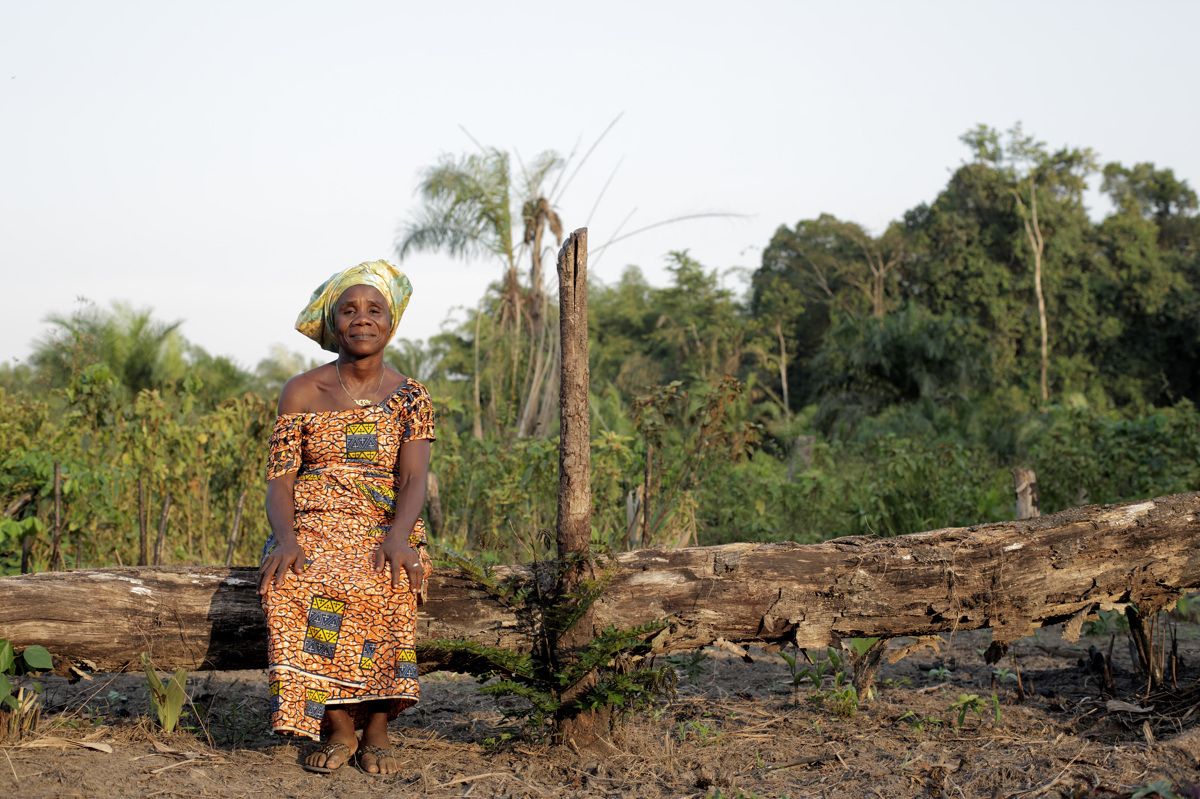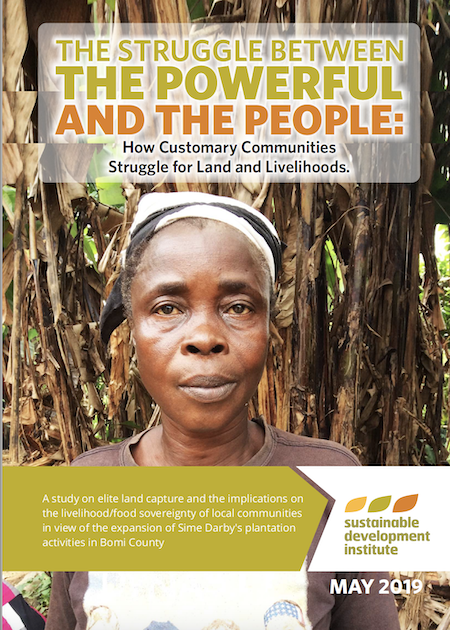The Land Rights Law (LRL), enacted on the 23rd of August 2018, was an impressive feat. It recognizes the land rights of all Liberians, especially rural communities who have historically been subject to mere user rights on their ancestral lands. The LRL protects the rights of communities to their claimed customary areas as their lawful property – “with or without deed”. This provision places an estimated 70% or more of the country under customary ownership. Each community may formalize this through registration and issue of a community land deed by the Liberian Land Authority (LLA). In contrast, private owners do not obtain recognition of ownership without formal titles or documented agreements they obtain from a community.
So far, 120 communities have been helped by civil society organizations to identify their respective customary lands, harmonize borders with neighbors, and elect a land management team – all requirements for formalizing their customary ownership. These claims cover at least 1.5 million hectares, or more than ten percent of all Liberia’s lands. Still, none of these CSOs supported communities have been issued the promised customary title deeds.
Meanwhile, interviews with members of civil society groups, confirmed by the LLA, suggest that some communities have received “customary deeds.” However, what remains unclear, and troubling is where, how, and when these deeds were issued. At the same time, reputable civil society organizations such as the Sustainable Development Institute (SDI) are encountering reports in communities suggesting that chiefs and elders are offering customary land to national elites - without the consent of the community, a violation of a fundamental principle of the Land Rights Law. Are these reports an indication of "illegal" land grabbing in rural communities?
A youth from Gbarsaw Clan in River Cess told one of the authors, "Some of our chiefs and elders are giving large [parcels] of lands to big people in government and other elites from Monrovia without consulting us. We find out about this when they enclose their land, plant permanent tree crops, and demarcate ‘their land’ – and often in our common areas”. It is disturbing that there are no public records of these dealings, and it is unclear how much land has been deeded or offered to national elites.
According to Liz Alden Wily, an international land tenure specialist, “‘a land rush’ for customary lands is not unusual when property law reforms recognize these lands as lawfully owned by communities and registrable as their collective property. The rush does not only affect fertile lands but valuable forest and mineral-bearing rangelands. “Elites, and governments themselves have been used to treating millions of hectares of their peoples’ community lands as ‘unowned’ or as de facto government lands and are often part of the rush”. She cites cases in Kenya where military, livestock, and forest sectors, and some devolved county governments are “laying claim to community lands as public lands prior to formal registration by affected communities, making it doubly hard for communities to secure their properties”.
Why do we see this trend in Liberia? Many causes can be identified. One is serious underfunding and capacity of the key supervisory institution, the Liberia Land Authority (LLA). It remains deprived of resources, money, and technical expertise, suggesting weak administrative and political will lie behind this. The sheer cost of launching a national titling program for customary lands may also have genuinely taken the Government by surprise, to which they have not yet adjusted. Or perhaps they do not wish to divert funds to this need, which may curtail their own rural land interests.
Over-centralization of authority is also a factor. All land-related decisions and resources are still heavily concentrated in Monrovia. The lack of devolved offices outside of Monrovia adds to the inability to learn about challenges and unlawful events as they arise. Even more, pressing is a lack of transparency in titling processes and inadequate grievance redress mechanisms. Consequently, there are serious concerns over the way land administration is currently structured, which leaves customary lands vulnerable to national elite control.
A Surge in Private Land Formalization is adding to pressures on customary lands. Over the past decade, media reports and civil society engagement have raised public awareness about large-scale foreign land acquisitions. However, recent reports from national CSOs and local communities, as well as a 2020 study by the Sustainable Development Institute (SDI), suggest that national elites and local investors are driving current trends of land acquisitions and evictions in Liberia. In the current climate, it is alarming to see speculative investments in farms, forests, and mineral-rich lands without a regulatory framework protecting local communities.
The role of chiefs and elders in customary land use and management remains unclear. Elders and chiefs have always guided land use and management in Liberia. However, the nature of their guidance under the current legal landscape is ambiguous in the absence of a standardized regulation. This ambiguity allows some chiefs to allocate land based on their preferences. For example, elders/chiefs who lack all the information about the current law, especially those who wish to use land as a negotiation offer to please elites or politicians for wealth or political consideration, may end up donating land to these elites without a careful evaluation.
The role of CSOs in a changing environment: Recent evidence suggests that CSOs’ engagement with the Liberia Land Authority (LLA) on substantial areas like producing relevant regulations to implement the law and commitments to a transparent partnership have significantly slowed down. Also notable is the lack of a clear engagement framework within civil society organizations (CSOs) to engage the LLA. For example, it is unclear how CSOs will be accommodated in ongoing partnerships with the LLA as implementation partners and advocacy groups. Many of the key CSOs currently working in the land sector are implementing the land rights law with the government (LLA) while also leading advocacy campaigns to ensure fairness, human rights, and transparency. These CSOs have experience managing such tension (collaboration and advocacy) with government agencies, but it remains a delicate balance for CSOs implementing projects that require the LLA's validation.
Meanwhile, the LLA believes that its actions are legitimate, given that local and international partners are working with them on projects. This seemingly simple gap undermines the role of a vibrant civil society by limiting the intensity, timing, and cohesion of CSOs in combating abuses in the land sector. Clearly, best practice would insist that CSOs play an active monitoring and advocacy role, holding power holders to account.
So, what could turn the tide in favor of customary land? First, the legislature (through the national budget) and international partners must support the country's land authority and associated land administrative agencies, including the courts, to address their institutional deficiencies related to land administration. For example, staff at the LLA – particularly its customary unit – could be given training, resources, and managerial authority to assist communities and NGOs in implementing and managing customary land formalization activities. However, supporting these agencies must be tied to holding government officials accountable - a role CSOs are best suited to play.
Second, CSOs must assist the government from a distance – setting clear boundaries so that organizations directly implementing projects with the government can do so effectively while maintaining enough independence to call out bad practices. Such a boundary should be structured as a relationship of support and advocacy for the community. In this line, the CSOs Working Group on Land Rights Reform (CSO-WGLLR) and the National Civil Society Council of Liberia (NCSCL) must ensure that organizations critical of government agents and power brokers can do their work with protection. NCSCL and CSO-WGLRR should work with national institutions such as legislators, courts, the Human Rights Commission, and transnational groups working on human rights issues and environmental protection to provide moral and legal protections for these groups.
At the same time, international partners, including on-ground implementers, must support local civil society groups with clearly defined roles and responsibilities. For example, international organizations implementing the land rights law can guide their efforts by working with local CSOs to promote awareness, transparency, and support communities to set up and train their land management committees.
CSOs should also develop a robust monitoring and reporting framework to systematically track and report illegal land transfers. An illegal land transfer can be contested in court. A good example of this is the Private Use Permit (PUP) case, which saw over 20% of the country's forest land illegally transferred to local and national elites. CSOs successfully challenged the PUPs, resulting in their cancellation and the prosecution of unscrupulous government officials. Clearly, civil society and community-based organizations are better suited to build on their relationships and knowledge of local power dynamics to implement the land rights law in an inclusive, transparent manner.
In the absence of these interventions, Liberia’s impressive Land Rights Law (LRL) could be used as a tool for elite land capture, resulting in a vicious circle of national and international land grabs. Like the state-led land grabs of the 1920s and 1950s and the alarming expansion of foreign concessions in the mid-2000s, communities in Liberia currently face what seems like elite-driven land grabs. Failure to develop clear progressive regulations and safeguard for CSOs and communities will not produce better results than in the past. It will only preserve or deepen inequalities and result in continued human rights abuses and environmental violations.



